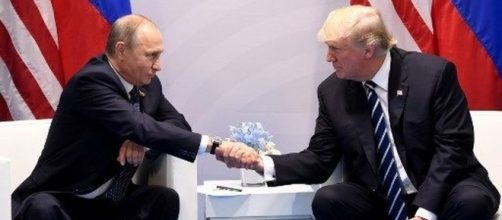Interviewed this Sunday, at the Cheltenham Literature Festival in Britain, former US secretary of State, Hillary Clinton, made several claims which targeted Russia's nefarious involvement, both in the US elections and the UK referendum.
The Democratic Party candidate, who lost to Trump in last November's election, went on, also suggesting that it is in Russia's interests to try and break up Nato and the European Union.
Labeling cyberspace as Putin's new tactical weapon in a revived Cold War, Clinton did not miss the opportunity to also suggest Britain's possible US trade partner - Trump, as someone unworthy of trust.
Brexit: 'The big lie is a very potent tool', Clinton said
As told by Clinton to the BBC, and while personally addressing the British, "You're making a trade deal with somebody who says he doesn't believe in trade...". She was referring to UK's possible NAFTA deal with the US and other major countries outside EU - a trade deal which, some argue, may have a better economic outcome for Britain than that with the EU.
She did not deny the existence of what she believes to be a close connection between US elections' "fabricated, false information" and UK's referendum, with both subject to the same treatment.
Expanding on her thoughts, Clinton kept on the topic, affirming the existence of evidence that Russia hacked both German politicians and French Emmanuel Macron's presidential campaign, also, Russia interfered in the Catalan Independence referendum in Spain.
'Get tough on Putin'
Relentlessly, she spoke of Russia threatening, disrupting and destabilising Europe. Clinton said, "We need to get serious when it comes to cyberspace and get tough on Putin."
Evocative, indeed, of a cold war, Clinton's failed presidential campaign is yet to recover from the hacking of Democratic National Committee's emails, then placed on the internet by Wikileaks' Julian Assange.
Accusing Wikileaks of being "an arm of Russian intelligence", Clinton points out we do not see Wikileaks dropping anything negative about Russia or Putin.
Brexit: Clinton does not forgive Google and Facebook
Subject to many interpretations, one admits, Hillary Clinton also poured scorn on giant tech-companies, Facebook and Google.
By permitting Russia to advertise on their platforms during the US presidential campaign, she saw it as a design to "fan the flames of division in our society".
"Paid in roubles", she added, while addressing Facebook on the matter. Lots of questions are yet to be answered.
With the daily redundancy of the Brexit topic surrounding the UK, most certainly for the very tense, upcoming years, these opinions come at a time when history is set to write another page in its long book of strategic alliances.
And as time runs out for the UK to grab the best deal, a raw, crude analysis puts Europe and the world in reality check. Historically, nations have always either done trade with each other, or went to war with each other. In between there is opinion.


